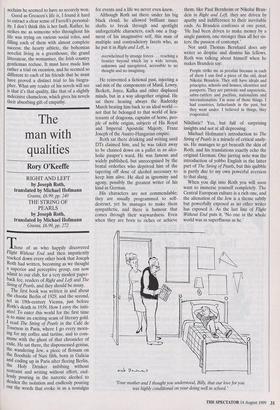The man with qualities
Rory O'Keeffe
hose of us who happily discovered Flight Without End and then impatiently tracked down every other book that Joseph Roth had written, becoming as we thought a superior and perceptive group, can now admit to our club, for a very modest paper- back fee, readers of Right and Left and The String of Pearls, and they should be many. The first book was written in and about the chaotic Berlin of 1929, and the second, set in 19th-century Vienna, just before Roth's death in 1939. How I envy the initi- ates! To enter this world for the first time Is to mine an exciting seam of literary gold. I read The String of Pearls in the Café de Tournon in Paris, where I go every morn- ing for my coffee and tartine, and to com- mune with the ghost of that chronicler of exile. He sat there, the dispossessed genius, the wandering Jew, a piece of flotsam on the floodtide of Nazi filth, born in Galicia and ending up in Paris after fleeing Berlin, the Holy Drinker imbibing without restraint and writing without effort, end- lessly pouring in the narcotic alcohol to deaden the isolation and endlessly pouring out the words that evoke in us a nostalgia for events and a life we never even knew.
Although Roth sat there under his big black cloud, he allowed brilliant inner shafts to break through and spotlight unforgettable characters, each one a frag- ment of his imaginative self, this man of multiple and contradictory facets who, as he put it in Right and Left, is
overwhelmed by strange forces ... reaching a frontier beyond which lay a wide terrain, unknown and unexplored, accessible to no thought and no imagining.
He reinvented a fictional past, injecting a sad mix of the components of Musil, Lowry, Beckett, Joyce, Kafka and other displaced minds, but in a way altogether original. He sat there hearing always the Radetzky March beating him back to an ideal world not that he belonged to that world of lieu- tenants of dragoons, captains of horse, peo- ple of noble origins, subjects of His Royal and Imperial Apostolic Majesty, Franz Joseph of the Austro-Hungarian empire.
Roth sat there drinking and writing until DTs claimed him, and he was taken away to be chained down on a pallet in an alco- holic pauper's ward. He was famous and widely published, but unrecognised by the brutal orderlies who deprived him of the tapering off dose of alcohol necessary to keep him alive. He died in ignominy and agony, possibly the greatest writer of his kind in German.
His characters are not commendable; they are usually programmed to self- destruct, yet he manages to make them sympathetic, and there is humour that comes through their waywardness. Even when they are born to riches or achieve them, like Paul Bernheim or Nikolai Bran- deis in Right and Left, they are driven by apathy and indifference to their inevitable ends. As Brandeis confesses at one point, `He had been driven to make money by a single passion, one stronger than all her sis- ters: the passion of contempt.'
Not until Thomas Bernhard does any writer so despise and dismiss his fellows. Roth was talking about himself when he makes Brandeis say:
People strike me as peculiar because in each of them I can find a piece of the old, dead Nikolai Brandeis. They still have ideals and principles, schools and houses, identities and passports. They are patriotic and unpatriotic, sabre-rattlers and pacifists, nationalists and internationalists. I'm none of those things. I had countries, fatherlands in the past, but they went under. I believed in things, they evaporated.
Nihilistic'? Yes, but full of surprising insights and not at all depressing.
Michael Hofmann's introduction to The String of Pearls is a miracle of critical analy- sis. He manages to get beneath the skin of Roth, and his translations exactly echo the original German. One jarring note was the introduction of yobbo English in the latter part of The String of Pearls, but this quibble is partly due to my own powerful aversion to that slang.
When you dip into Roth you will soon want to immerse yourself completely. The Central European culture is a rich one, and the alienation of the Jew is a theme subtly but powerfully exposed as no other writer has exposed it. As the last line of Flight Without End puts it, 'No one in the whole world was as superfluous as he.'
`Your mother and I thought you understood, Billy, that our love for you was highly conditional on your doing well in school.'


























































 Previous page
Previous page